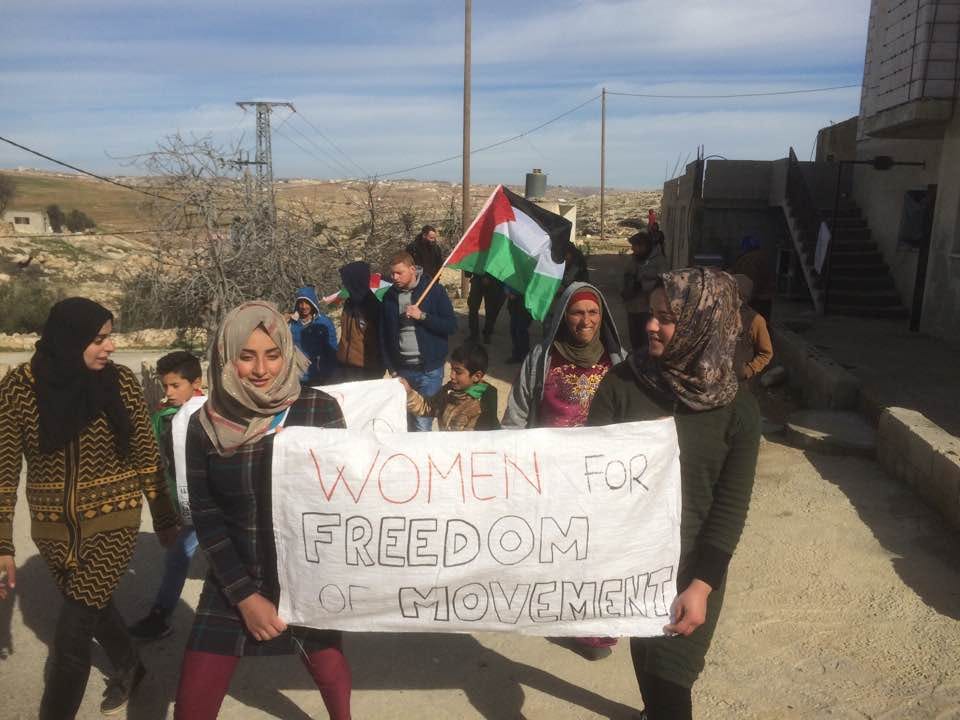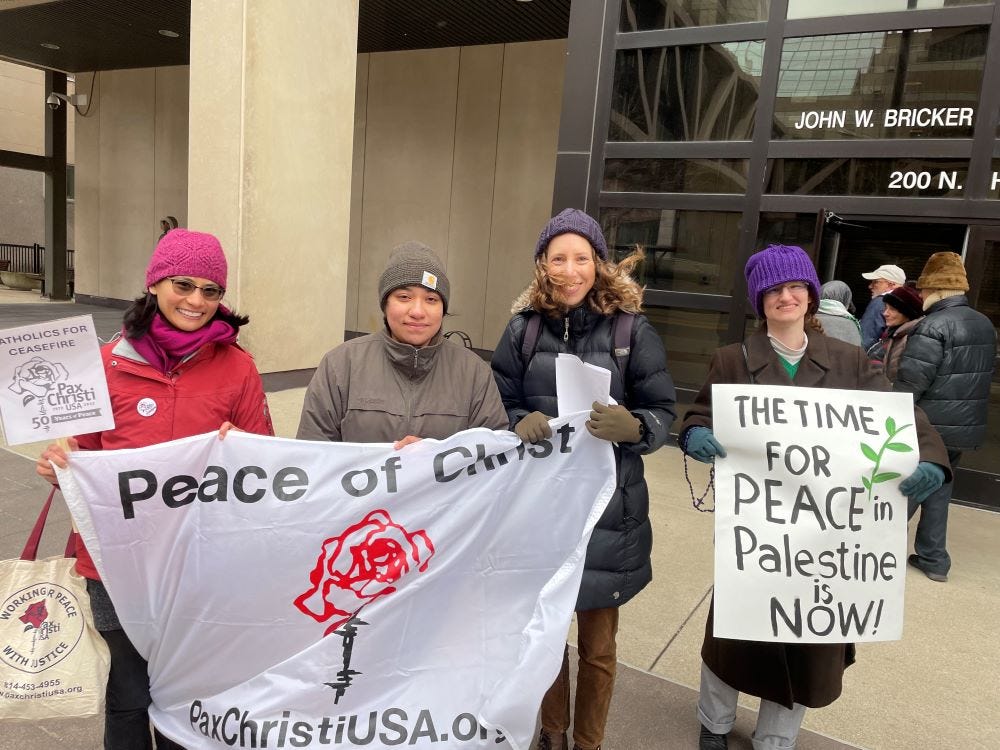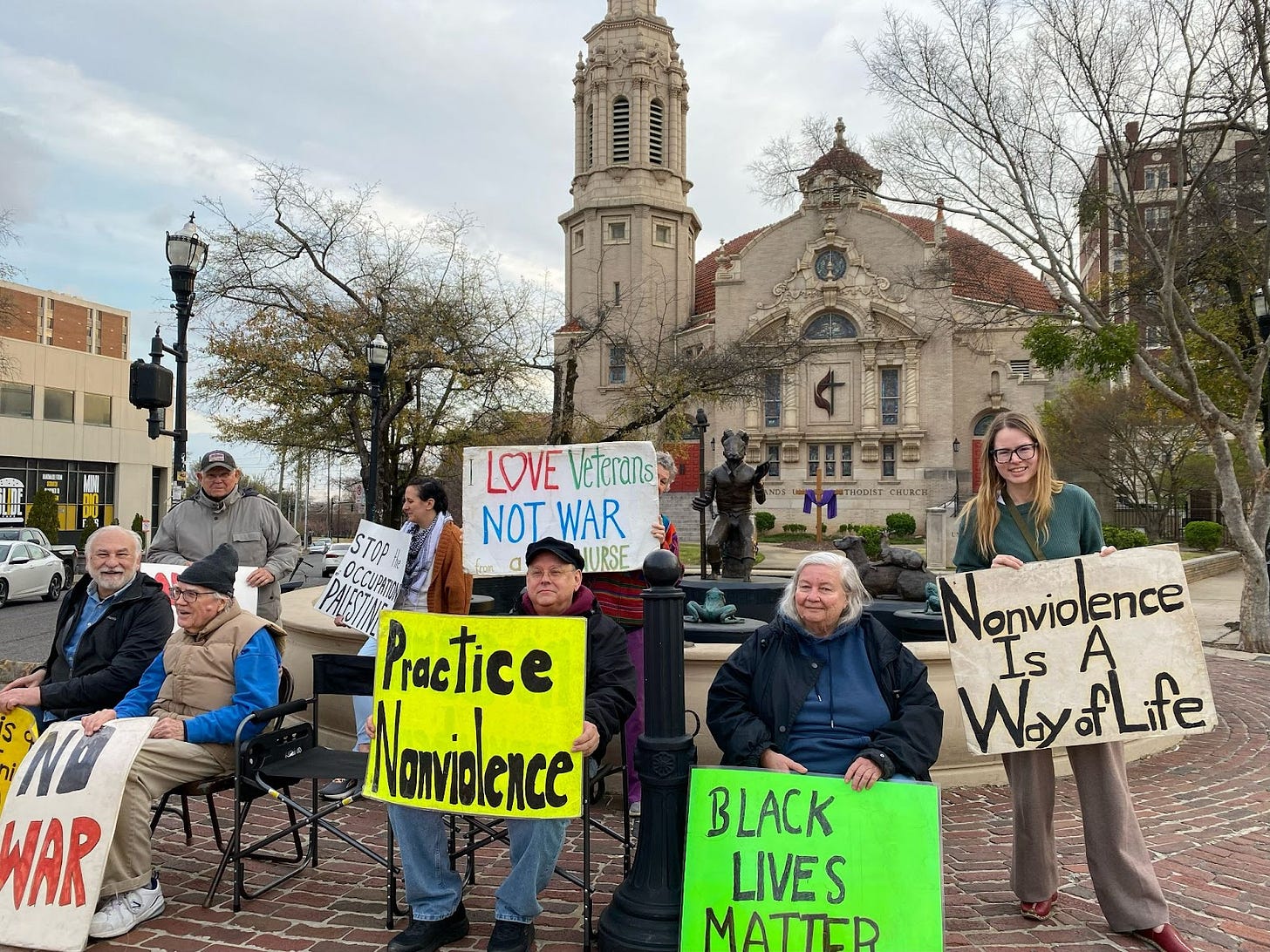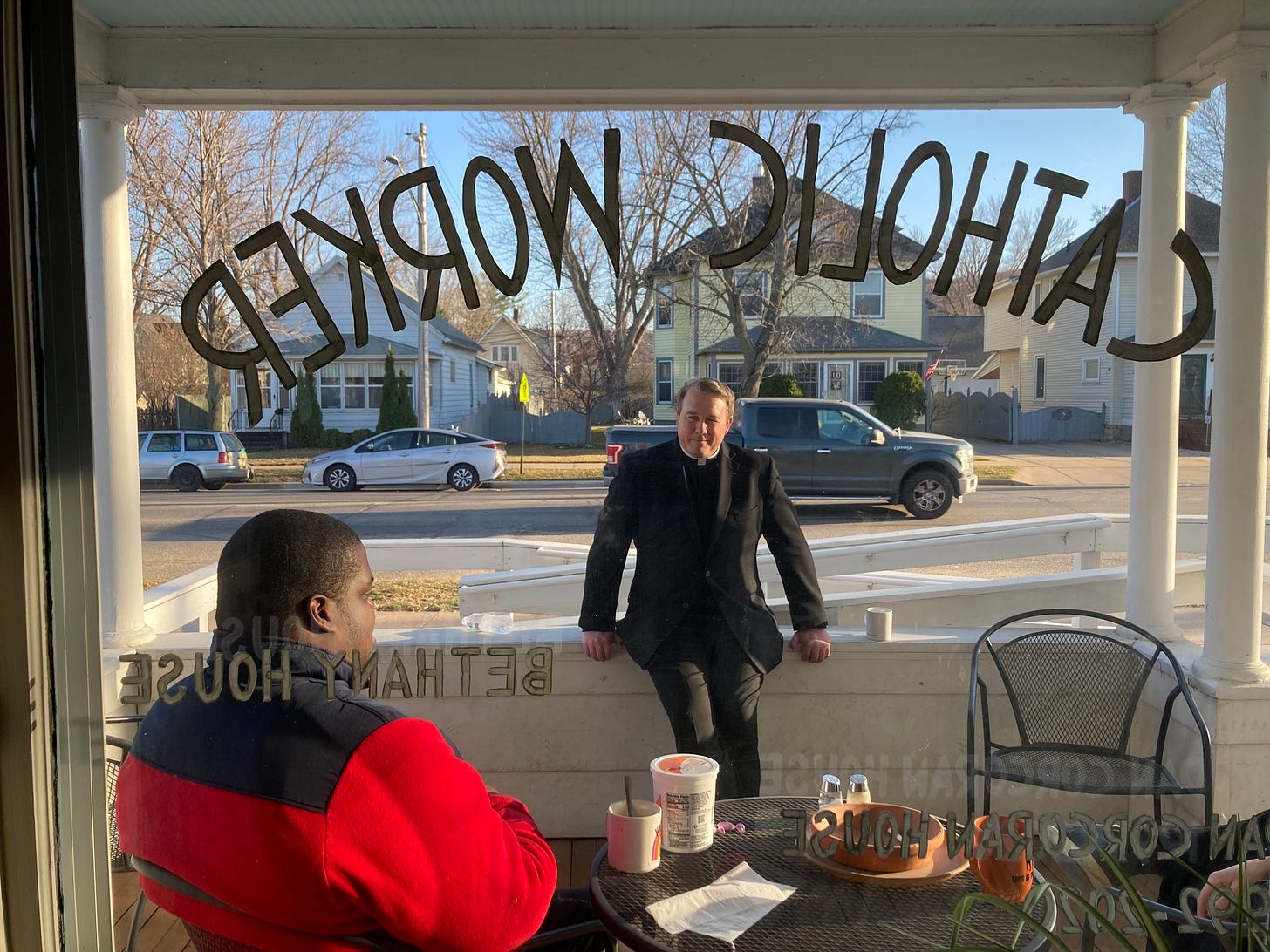Celebrating Catholic Worker Art
Two CW artists launch a newsletter devoted to CW art. Plus: CWers confront elected officials over Gaza ceasefire; news from the West Bank; March newsletters; and more.
Just Doing the Work Is Holy
Earlier this week, I called the Bloomington (Indiana) Catholic Worker trying to track down the author of a great piece that I’d like to share with readers of CatholicWorker.org. The essay, by Lauren Johnson, is titled “The Catholic Worker as a Family.” In it, she notes that the grand vision of the Catholic Worker, “the slow revolution of the heart, the creation of a new society in the shell of the old.” doesn’t mention anything about “the daily grind of family life,” namely, the “dishes to be washed, children to be calmed, grievances to be aired.”
“These are chores in the most basic sense; they are mundane acts of devotion to the creation of communal life,” she writes. These small, unseen, unsung “acts of devotion” are perhaps the mustard seed from which that new society will grow.
The woman who returned my call explained that “L.J.” had written the piece ten years ago and had moved on, but that someone else in the community might have her contact information, except they were traveling, so it might be a few days…etc., etc.
I thanked her and then, to make conversation, asked whether the Bloomington CW had participated in the recent Day of Action for a ceasefire in Gaza.
“No,” she said. “We just had the community meal, though.”
This issue is full of news about Catholic Workers doing the headline-grabbing work of creating a new society in the shell of the old. But maybe we ought to be writing more about the “mundane” work of community building that hundreds of Catholic Workers carry out every day.
Jerry Windley-Daoust
P.S. Lauren, if you’re out there, get in touch!
P.P.S. A programing note: We’re taking Holy Week off next week, so the next Roundtable will land in your inbox April 5.
FEATURED
Celebrating CW Artists with ‘The Illuminator’
While visiting the New York Catholic Worker’s Maryhouse last year, Sarah Fuller and Becky McIntyre spent a week in a storage room surrounded by 943 thin metal plates containing copies of art from The Catholic Worker newspaper. They were there to photograph, identify, and catalog each of the artworks, many of them by “the big three” Catholic Worker artists: Ade Bethune, Fritz Eichenberg, and Rita Corbin. Other art was by lesser-known artists who would have been familiar to long-time readers of the paper: Gary Donatelli and Meinrad Craighead, among others.
As they worked, Fuller and McIntyre talked about an idea they had been kicking around for a while: Why not start a newsletter devoted specifically to Catholic Worker artists?
“It’s a pretty serious movement about serious issues,” Fuller said, “but it’s also about beauty. So, we thought it’d be fun to make connections through that while we’re dealing with all the rest of it.”
McIntyre felt similarly. “We thought it’d be really cool to build community among artists specifically in the Catholic Worker,” McIntyre said. “There are so many folks who fly under the radar.”
Fuller and McIntyre are both well-known and respected Catholic Worker artists in their own right. They met at the Los Angeles Catholic Worker in 2019.
Their Catholic Worker art newsletter, The Illuminator, launched on Wednesday. In the inaugural issue they explained the reason for newsletter’s name:
We wanted to convey the idea of bringing light, inspiration, imagination, and clarification, but it is also a reference to the process of illustrating or adorning a manuscript. From the beginning of the Catholic Worker, when Ade Bethune asked Dorothy Day if she could make illustrations to help improve the look, feel, and message of the Catholic Worker newspaper, artists have asked or have been asked to participate in the life of the movement. Today, there is a great tradition of art by artists like Ade Bethune, Fritz Eichenberg, and Rita Corbin that is used in the Catholic Worker newspaper, and in the communications of many other Catholic Worker communities as well. Community houses and buildings are decorated with art by these and other artists. People are making new art for newsletters, protests, vigils, and to beautify spaces and edify and welcome those who come through those spaces. Art is gifted to houses by supporters, artists, and the many folks who make their way into and out of communities. The Catholic Worker is a movement of ideas and clarification of thought, and it is also a movement of daily, embodied, practical actions undertaken with a spirit of love. The arts find a place to illuminate - explain, decorate, inspire - these various aspects.
You can read Renee Roden’s article about The Illuminator and see an image gallery of McIntyre and Fuller’s artwork at CatholicWorker.org: Catholic Worker Artists Celebrated in New CW Publication. And you can sign up for the newsletter here.
CWer’s Palestinian Friends Report Widespread Violence, Dislocation in West Bank

Cassandra Dixon, a longtime Catholic Worker from rural Wisconsin who has done peace work in the West Bank for most of the past 15 years, tells Roundtable that conditions for her Palestinian friends are “worse than I could ever have imagined. Every conversation brings news of some fresh and previously unimaginable hell.”
Dixon, who works as a carpenter and also operates Mary House of Hospitality, spends several months of every year in the West Bank. There, she accompanies school children, shepherds, and other Palestinians traveling from one place to another in order to provide some level of protection from attacks by Israeli settlers. (She herself was seriously injured in a settler attack last spring.)
Dixon says she knows several families who take their children to sleep in the hills at night to avoid the frequent overnight settler attacks on their houses. Multiple West Bank Palestinian villages, including one she visited last year, have been emptied by frequent night raids and settlers chasing their grazing animals during the day. Meanwhile, road closures, increased checkpoints, and arbitrary detentions have affected many of her friends' ability to support themselves:
My friend Laila is the main support of a household of 16 people, most of them children. Both of her sons are now unable to reach their jobs, and the entire family is surviving on the embroidery that Laila manages to ship here for sale in the US. When I talk with her, Calendar you go well OK I can sometimes hear the F-16s and F-35’s over her house on their way to Gaza, about 11 miles away. The doors in her house shake in their frames and she can hear the bombing. None of her children or grandchildren are sleeping, and all of them are hungry all the time. She tells me she feels her mind will explode from the stress. Dozens of people have been rounded up and kidnapped by soldiers from her village, and she is desperately afraid for her sons.
You can read her full letter at the CatholicWorker.org website: West Bank Palestinians Suffering from Widespread Violence, CW Activist Reports.
Catholic Workers Join Nationwide Day of Action at Elected Officials’ Offices

Catholic Workers were among hundreds of Christian activists who confronted elected leaders on Monday to demand a ceasefire in Gaza.
Brenna Cussen Anglada (St. Isidore Catholic Worker, Cuba City, Wisconsin) helped organize a demonstration of about 50 people outside the Dubuque office of U.S. Rep. Ashley Hinson, R-Iowa, according to the Dubuque Telegraph Herald. “At this point, Israel has killed over 30,000 people, displaced hundreds of thousands and collapsed the health care system in Gaza,” the newspaper quoted her as saying. “Those who are still alive in Gaza face dehydration, starvation and disease.”
In Columbus, Ohio, Roundtable reader Theresa Marie Thompson joined the Dominican Sisters of Peace and members of Pax Christi USA outside the offices of Sen. Sherrod Brown (D-Ohio).
“When I arrived about twenty people were praying, singing, and holding handmade signs, and they handed one to me,” Thompson wrote. “Only three people were allowed to go inside to try to speak to our senator, and in the end, they only got to speak to one of his staff who barely seemed to listen, but I know these modern-day prophets will keep raising their voices until they are heard.”
Meanwhile, Catholic Workers in Missouri challenged Sen. Josh Hawley (R-Missouri) and Sen. Eric Schmitt (R-Missouri) to support a ceasefire in Gaza. A group of peace activists gathered for a clarification of thought at St. Francis Catholic Worker House in Columbia, Missouri, about the violence in Gaza. They then marched to their state senators’ offices in the state capitol complex and attempted to dialogue with the senators, who are not on record as supporting a ceasefire. They fixed images of the damage and destruction in Gaza to the office door, according to local news outlets.
“Please excuse our dramatic attempt to gain your attention,” the peace activists wrote in their letter to the senators. “But 31,000 people in Gaza are dead now and American taxpayers helped provide the munitions and weapons used to kill them.” The signees of the letter included Catholic Workers Steve Jacobs and Jeff Stack and members of Veterans for Peace and the Fellowship of Reconciliation. “The U.S. taxpayers are now complicit in aiding and abetting Israeli war crimes, and paying for the munitions used for blowing up hospitals and ambulances, bulldozing graveyards, killing doctors,” they continued. They expressed their distress about affixing images of violence and graphic images of suffering children to these office doors, but the gravity of the war crimes, they said, demanded action: “We don't want you to turn away. The killing has been indiscriminate.”
Jacobs—who founded St. Francis House Catholic Worker with Jeff Stack 41 years ago—said that the atmosphere was very calm at the offices. “It wasn't about getting arrested,” he said in an email to Roundtable. “It was about getting the visual evidence of the atrocities in front of (the senators) and challenging them to be better human beings.”
He said some of the protestors witnessed Sen. Hawley’s staff removing some of the 100 photos they had brought. But others in the group saw the senator’s staff bringing the letter addressed to Hawley and some photos into his office. Jacobs felt “pretty sure” that the senator had since heard their message and witnessed the Gazans’ suffering.
Jacobs hopes that they can respond to the suffering that the world is witnessing in Gaza “in a more human and compassionate manner.”
BRIEFLY
Bishop Robert Barron visited the Winona Catholic Worker on Tuesday, the feast of St Joseph. Barron, the bishop of the Diocese of Winona-Rochester and founder of Word on Fire Catholic Ministries, frequently cites Dorothy Day as a source of inspiration and a model of holiness. During his visit, he shared chicken noodle soup with guests, offered a blessing, and spoke warmly about the Catholic Worker Movement. See a short write-up and photos at CatholicWorker.org.

Shelley and Jim Douglass (Mary’s House, Birmingham, Alabama) have been holding a “be-in” for peace and justice in Birmingham’s Five Points Neighborhood for an hour once a week with friends and fellow activists since 1995. Their signs provoke questions, encounters, prompt thumbs up and joyful honks from bus drivers. They often greet and pass out sandwiches to unhoused neighbors at the encampment in Magnolia Park one block away. After September 11, 2001, they started holding vigils on Saturdays as well.
Sisters of the Order of Saint Benedict raised more than $1,400 to support Laundry Love at the Central Minnesota Catholic Worker (St. Joseph, Minnesota). The twice-monthly event provides free laundry services to those who need it.
“I have the mixed privilege and burden of British citizenship, a Jewish upbringing, and eight years as a human rights observer in Gaza and the West Bank,” writes John Lynes in the Easter issue of the London Catholic Worker newsletter. That background gives him a complicated perspective on the tragedy unfolding in the Middle East: “In a situation of oppression we cannot pretend to be neutral. But when we rightly speak out for Palestinian rights, we need to recognise that we are up against two traumatised communities…. It is easy to blame this side or that. The language of blame – ‘apartheid’, ‘genocide’, ‘terrorist’, ‘boycott’ – can only exacerbate the tragedy. The Holy Land cries out for prayer, for empathy, for mutual compassion, for reconciliation.” You can read his essay and the entire newsletter at the London Catholic Worker website.
The New York Catholic Worker held its monthly vigil for Yemen in Union Square on Saturday, March 16; see photos and video on Facebook.
People who knew Dorothy Day personally share their memories and the impact she had on their lives in the new issue of The Catholic Radical, the newsletter of Sts. Francis and Therese Catholic Worker (Worcester, Massachusetts). The issue also contains satirical articles in honor of April Fool’s Day and a preview of the new graphic novel forthcoming from Paulist Press this fall, Dorothy Day: Radical Devotion. You can read the entire issue here.
“I’ve decided to commit time and energy to writing a book,” the Rev. Bob Cook writes in the latest issue of Via Pacis, newsletter of the Des Moines Catholic Worker. “I am going to title it Who Are the Spirits of the Streets? The book will be a series of interviews of people who come to Dingman House for food and fellowship.” Elsewhere in the issue, Frank Cordaro reports that “Getting Old Ain’t for Sissies–Even at the Des Moines Catholic Worker.” He writes: “As for me, I turn 73 this February, and I feel my age. Truth is, I am no longer the organizer and front-line activist I was most of my Catholic Worker years…. The most important resistance work I’m doing now is to support our Des Moines Catholic Worker community’s front-line resistors, specifically, Jessica Reznicek and Julie Brown.” You can read the entire newsletter here.
St. Isidore Catholic Worker Farm is planning a weeklong retreat “to deepen into the stories, spirituality, and healing of the land” in June. The week will include “gardening and composting, prayer and silence, celebration and song, colonialism and Indigenous history, trees and prairie, repair and healing, reading and delicious food.” Get details on the event page: Stories of the Land: Decolonization, Earth Regeneration, & Spiritual Ecology.
CALENDAR
March 23 - March 29 | Nevada
Sacred Peace Walk (Nevada Desert Experience)
April 12 - April 15 | Kansas City, Missouri
Midwest Catholic Worker Faith & Resistance Retreat
April 13 | The Center at Mariandale, Ossining, New York
Revolution of the Heart: The Spirituality of Dorothy Day
April 28 | Staten Island, New York
Dorothy Day Art Show & Craft Fundraiser
May 8 - May 12 | Kent, Great Britain
European Catholic Worker Gathering 2024
June 3 - June 7 | Cuba City, Wisconsin
Stories of the Land: Decolonization, Earth Regeneration, & Spiritual Ecology
A FEW GOOD WORDS
The Work Is More Important
From House of Hospitality: Chapter Three
by Dorothy Day
Following Peter’s ideas, we are trying to make the workers into scholars and the scholars workers. So we take whoever comes to us as sent by God and do not believe in picking and choosing. If we start eliminating then there is no end to it. Everyone wishes to eliminate someone else. In a group of people living together more or less in community, grievances always pile up which change from day to day and from month to month. Even if we had only picked “intellectuals”, young students and propagandists, there would be dissensions and grave differences of opinion. Tom and Dorothy are more at home with the scholars and wish to concentrate more on propaganda. As it is, most of the money is spent on food and shelter and not much is left for the paper and for pamphlets.
But Peter and I feel that the work is more important than the talking and writing about the work. It has always been through the performance of the works of mercy that love is expressed, that people are converted, that the masses are reached.
Read the entire chapter here: House of Hospitality: Chapter Three
Thanks to Renee Roden (see her Substack, Sweet Unrest), Zak Sather, and Rosalie Riegle for their help with this week’s newsletter. Thanks also to the National Catholic Worker E-mail List team, whose work provides the leads for many of our items.
Roundtable is an independent publication of CatholicWorker.org. It is not affiliated with The Catholic Worker newspaper published by the New York Catholic Worker.








